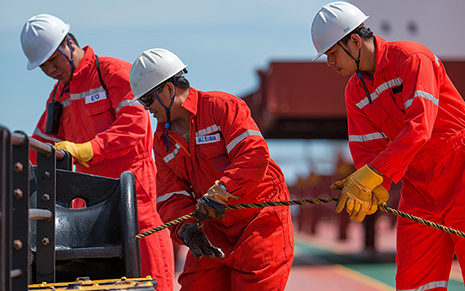You are here
The business case for physiotherapy for seafarers
The business case for physiotherapy for seafarers
February 21, 2023 https://splash247.com/the-business-case-for-physiotherapy-for-seafarers/
Investing in crew health and wellbeing helps prudent shipowners comply with ESG values, attract and retain seafarers, and distinguish themselves from competitors. Sandra Welch, CEO of the Seafarers Hospital Society (SHS), explains how freely available physiotherapy resources can benefit shipowners and operators.
Over the last few years, seafarers have faced new unforeseen challenges that have affected their mental and physical health. In 2021, physiotherapists working with the Seafarers Hospital Society (SHS) found that, of the seafarers being referred through our service, 54% had back injuries, 26% had knee injuries, and 22% had upper limb or neck injuries.
The industry is aware of this and has placed health and wellbeing initiatives at the forefront of industry discussion and action. We can see that this is working. The latest Seafarer Happiness Index in 2022 shows a sustained recovery in seafarer satisfaction from a record low of 5.8 in Q1 to 7.72 in Q4. But while this is a huge improvement, it is just the beginning of implementing health and wellbeing measures for seafarers.
You might find that during an economic crisis, the easiest costs to cut often impact crew welfare. But many companies are already running crews on a shoestring. And with stress and fatigue known factors that contribute to poor work performance and little recourse for crew, this can negatively impact safety in the workplace.
We want seafarers to be fully available to perform their duties, and to do this, we as an industry need to provide crew with the support they need to do their jobs consistently.
In the ongoing situation, every ship owner or operator has noticed the necessity of seafarer health and wellbeing initiatives. Active measures to protect crew members’ health and wellbeing can result in a crew that works at optimal efficiency. To help facilitate this, SHS has collaborated with HCPC registered physiotherapist Jen Cardew to create free videos that focus on preventing musculoskeletal injuries in seafarers.
Healthcare expertise
The videos are a series of stretching exercises targeting specific muscles that are susceptible to injury through repetitive work and motions or regions that can become stiff when stuck in static postures for prolonged periods of time. Stretching can help reduce stress and body aches and improve flexibility and the range of motion in your joints, helping to improve physical and mental health. Without stretching, muscles shorten and get tight, putting mariners at risk of joint pain, strain, and muscle damage, which can impact their ability to work.
We recognise that repetitive strain injuries can affect shore-based and offshore staff, which is why the videos accommodate both environments. The exercises can be performed in small spaces with minimal equipment and are available to be pre-downloaded so that they can be accessed when there is no Internet connection.
Alternatively, seafarers operating in UK waters can utilise the expertise of healthcare professionals who work with and alongside the maritime industry to receive bespoke help by accessing the SHS’s free physiotherapy network. Not all activity is going to give you the same result, which is why working with a state-registered physiotherapist who can prescribe the necessary treatment is a pragmatic solution.
Health and safety
We know that proactive injury prevention measures can help improve vessel safety while lowering crew turnover due to injury. This is especially important as the industry works to attract new people while retaining experienced personnel. To do this, we need to ensure that the systems installed are sustainable and provide seafarers with the tools they need to do their work safely.
If injuries are not dealt with, the quality of work onboard is compromised, which can result in additional costs for operators. Conscientious employers will want to avoid this. Employers who prioritise the health and safety of seafarers exhibit the traits of a good ship owner, which not only helps with recruitment and retention but also illustrates compliance with ESG values, making you a more competitive company.
Compliance with health and safety regulations is already a requirement, so why not take the extra steps to differentiate yourself from your competitors by implementing healthcare resources that help prevent injuries in the existing workforce. Particularly as implementing these initiatives can improve a company’s reputation, reduce sick leave rates and enhance seafarer satisfaction, leading to fewer mistakes, greater crew bonding and a reduced risk of crew leaving.
We want to ensure that all the expertise maritime currently has is not lost and that new talent is attracted. To do this, we need to implement simple, cost-effective measures to protect seafarers’ health and wellbeing. These free resources addressing some of the most common injuries affecting seafarers are an ideal starting point.
SHS physiotherapy resources for seafarers as well as the preventative exercises can be found here (https://seahospital.org.uk/help-for-you/fast-track-physiotherapy/).
The exercise videos are also available free of charge (https://shop.oceantg.com/product/seafarers-hospital-society-fit-and-heal...) to seafarers who have access to OTG’s Ocean Learning Platform (OLP) via a company subscription, or directly from the Ocean’s self-service platform.

